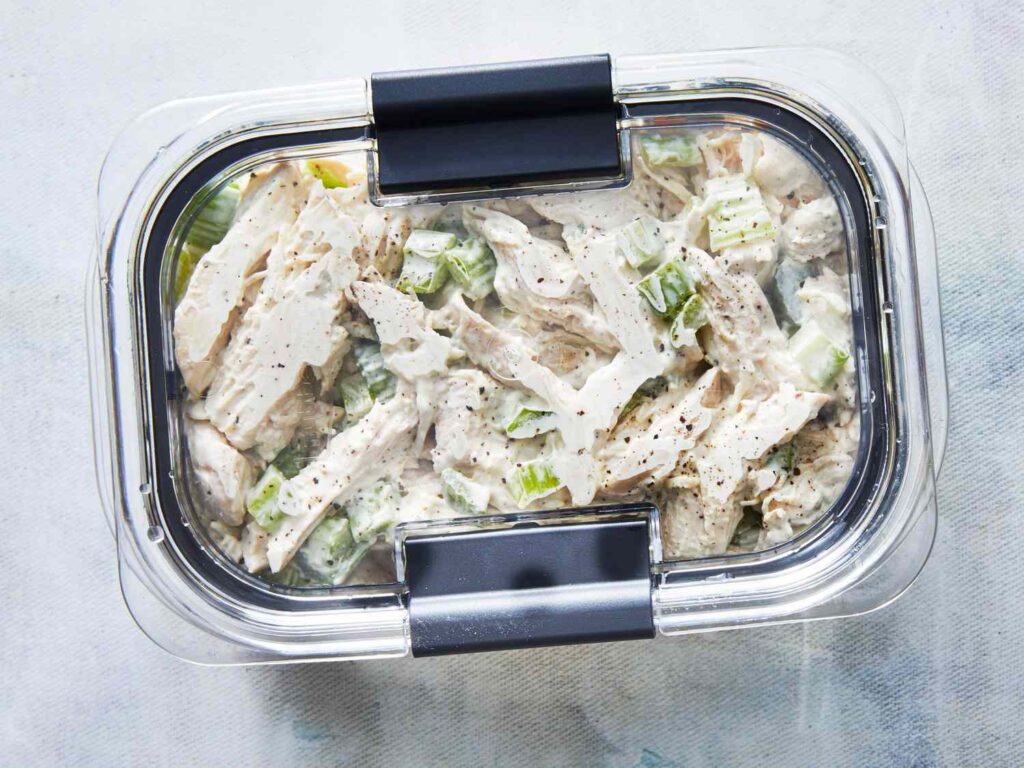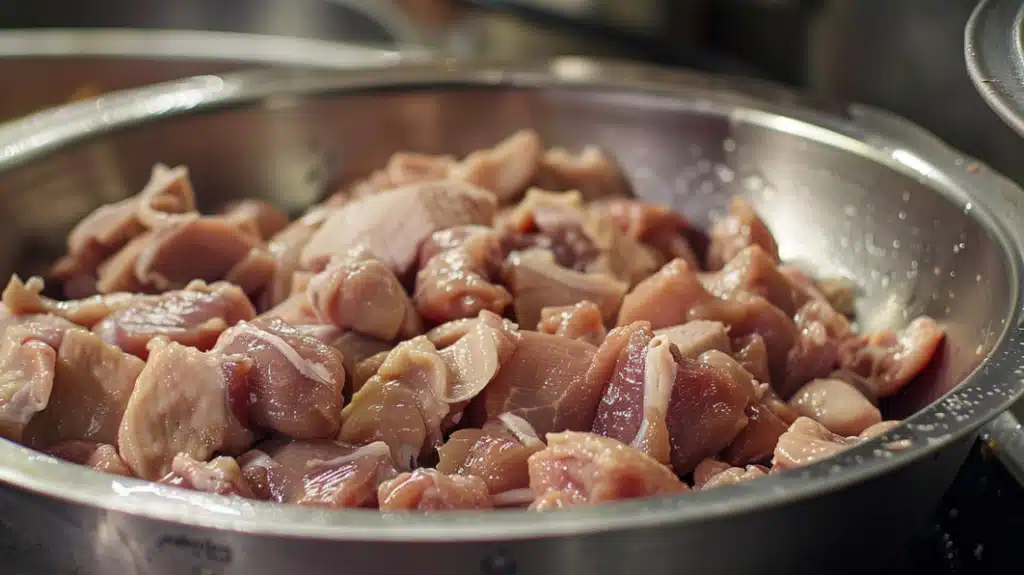Chicken is a versatile and popular protein, but sometimes, it can have an unpleasant odor that lingers even after cooking.
This foul smell can be off-putting and make your meal less enjoyable. Fortunately, there are natural ways to eliminate the odor and ensure your chicken dishes taste great every time.
In this blog post, we’ll explore several effective techniques for eliminating the bad smell of chicken using simple ingredients like onions, vinegar, and salt.
We’ll guide you through the step-by-step process so you can confidently prepare delicious, odor-free chicken meals for your family and friends.
Natural Remedies to Eliminate Bad Odor

Natural remedies are effective in eliminating bad odor in chicken, providing a healthier and environmentally friendly alternative to chemical solutions.
1. Vinegar
Vinegar is acidic, which helps break down odor-causing compounds.It also has antibacterial properties that help kill bacteria causing bad smells.
Methods of Using Vinegar on Chicken
- Marinade: Soak chicken in a mixture of water and vinegar (1:1 ratio) for 20-30 minutes.
- Rinse: After marinating, rinse the chicken thoroughly with cold water to remove the vinegar taste.
Tips: Use apple cider vinegar for a milder taste if desired.
2. Lemon Juice
Lemon juice is a natural deodorizer and has antibacterial properties.It adds a fresh, pleasant aroma to the chicken.
Step-by-Step Process for Application
- Marinade: Squeeze the juice of one lemon over the chicken and let it sit for 15-20 minutes.
- Rinse: Rinse the chicken with cold water before cooking to reduce the lemon flavor if desired.
Tips: Combine lemon juice with herbs for an enhanced marinade.
3. Salt and Water Solution
Salt draws out moisture and bacteria from the chicken, which helps reduce odor.It creates a brine that enhances the flavor and tenderness of the meat.
Preparation and Usage Instructions
- Brine Solution: Dissolve 1/4 cup of salt in 1 quart of water. Submerge the chicken in the solution for at least 30 minutes, up to 2 hours.
- Rinse: Rinse the chicken thoroughly with cold water before cooking to remove excess salt.
Tips: Add a tablespoon of sugar to the brine for added flavor.
4. Baking Soda
Baking soda is a natural deodorizer that absorbs and neutralizes unpleasant smells.
Application Techniques
- Rub: Sprinkle baking soda over the chicken and rub it in. Let it sit for 15-20 minutes.
- Rinse: Rinse the chicken thoroughly with cold water to remove all traces of baking soda.
Tips: Ensure thorough rinsing to avoid any baking soda residue.
5. Herbal Remedies
Herbs like Thyme, Rosemary, and Sage have natural antimicrobial properties and add a fresh aroma to the chicken.They can be used individually or in combination for enhanced effect.
Incorporating Herbs into the Cleaning Process
- Marinade: Create a marinade using fresh or dried herbs, olive oil, and lemon juice. Coat the chicken and let it sit for at least 30 minutes.
- Stuffing: Place fresh herbs inside the cavity of the chicken before cooking to infuse it with flavor.
Tips: Fresh herbs are more effective but dried herbs can also be used in a pinch.
Proper Storage Techniques for Preventing Bad Odor in Chicken
- Refrigeration: Store chicken in the coldest part of the refrigerator (below 40°F). Use airtight containers or plastic wrap to prevent air exposure and cross-contamination.
- Freezing: For long-term storage, freeze chicken at 0°F. Use freezer bags or vacuum-sealed bags to maintain freshness and prevent freezer burn.
Tips
- Label and date frozen chicken to keep track of storage times and use within recommended periods.
- Avoiding Temperature Fluctuations:
- Keep chicken at a consistent temperature to prevent bacterial growth.
- Minimize the time chicken is left out at room temperature during handling and transportation.
Understanding the Causes of Bad Odor in Chicken

Bad odor in chicken can stem from several factors, primarily related to handling, storage, contamination, spoilage, and feed quality.
1. Poor Handling and Storage Practices
- Improper handling and storage can lead to bacterial growth and spoilage.
- Always refrigerate chicken at the correct temperature (below 40°F).
- Ensure proper hygiene while handling raw chicken to prevent cross-contamination.
Tips: Store chicken in airtight containers and place it in the coldest part of the refrigerator.
2. Bacterial Contamination
- Bacteria such as Salmonella and Campylobacter can cause unpleasant odors.
- Contamination often occurs during processing and can be exacerbated by poor storage conditions.
- Use safe food handling practices, including thorough washing and cooking to safe temperatures.
Tips: Use separate cutting boards for raw meat and other foods, and wash hands and surfaces thoroughly after handling chicken.
3. Spoilage Due to Temperature Changes
- Fluctuations in temperature can accelerate spoilage, leading to bad odor.
- Keep chicken consistently cold during transportation from the store to home.
- Avoid leaving chicken out at room temperature for extended periods.
Tips: Thaw chicken in the refrigerator or use a cold-water bath, changing the water every 30 minutes.
4. Quality of Chicken Feed
- The diet of chickens can influence the smell of their meat.
- High-quality feed without additives or antibiotics results in better-smelling chicken.
- Organic or free-range chickens often have fewer issues with bad odor due to their natural diet.
Tips: Look for labels indicating organic or free-range chicken, which are more likely to have a better diet.
Conclusion
Eliminating bad odor from chicken is crucial for enjoying delicious and safe meals.
By understanding the causes of unpleasant smells, such as poor handling, bacterial contamination, and spoilage, you can take steps to prevent these issues.
Incorporating natural remedies like vinegar, lemon juice, salt, baking soda, and herbs into your cleaning process can effectively neutralize odors and enhance the flavor of your chicken.
Additionally, proper storage techniques, purchasing fresh, high-quality chicken, and following best practices for handling and preparation will help maintain your chicken’s freshness and avoid bad odors.
By implementing these strategies, you can confidently serve flavorful, odor-free chicken dishes to your family and friends.
So, the next time you encounter smelly chicken, remember these tips and enjoy the mouthwatering results!
Frequently Asked Questions
How to Get Rid of Cooked Chicken Smell?
To eliminate the smell of cooked chicken, use natural deodorizers like vinegar, lemon juice, or baking soda. Rinse the chicken thoroughly after applying these remedies.
How Do You Cook Chicken So It Doesn’t Smell?
Cook chicken so it doesn’t smell by marinating it with herbs, spices, and citrus juices. Ensure proper storage and handling to prevent bacterial growth and odors.
Can Salt Remove Chicken Smell?
Yes, salt can remove the chicken smell. Rub the chicken with salt and let it sit for a few minutes before rinsing thoroughly with cold water.
How Do You Cover up The Smell of Chicken?
To mask the smell of chicken, use strong aromatic ingredients like garlic, ginger, onion, or herbs in your marinade or cooking process.




